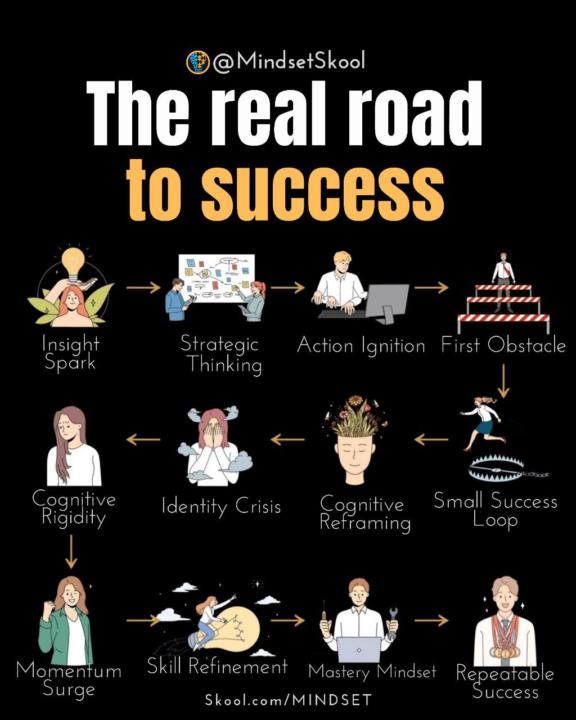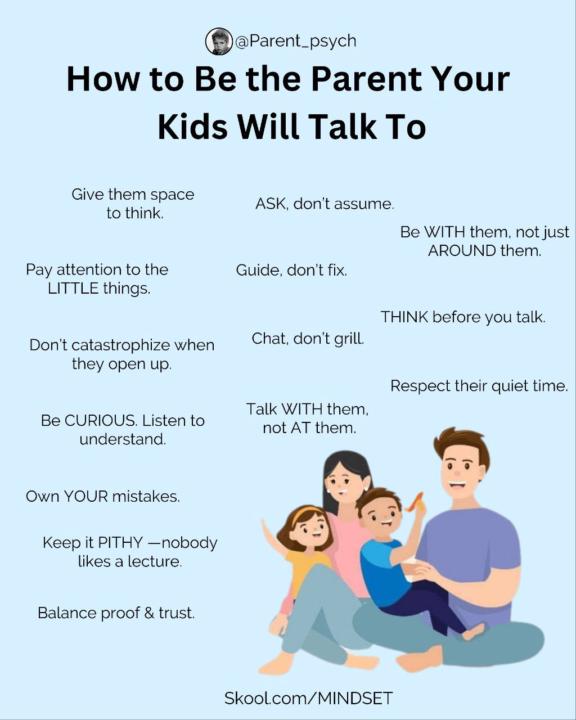Activity
Mon
Wed
Fri
Sun
Oct
Nov
Dec
Jan
Feb
Mar
Apr
May
Jun
Jul
Aug
Sep
What is this?
Less
More
Memberships
Mindset MasterClass
249 members • Free
12 contributions to Mindset MasterClass
The Real Road to Success 🚀
(Shoe🥾Leather Psychology Edition) 1. Insight Spark → Your brain detects a pattern or problem needing a solution. 2. Strategic Thinking → This motive motivates mapping out cognitive strategies and next steps. 3. Action Ignition → You engage your prefrontal cortex to initiate execution as motive becomes movement. 4. First Obstacle → Your brain resists change, triggering stress responses. 5. Cognitive Rigidity → The brain prefers what’s familiar, so doubt creeps in. 6. Identity Crisis → A temporary disconnect between belief and action causes discomfort. 7. Cognitive Reframing → You retrain your brain to see challenges as stepping stones. 8. Small Success Loop → The brain rewards meaning-based repetition with dopamine, reinforcing effort. 9. Momentum Surge → Neural pathways strengthen, creating discipline and making action easier and more automatic. 10. Skill Refinement → The brain optimizes efficiency through repetition and learning. Discipline becomes habit. 11. Mastery Mindset → You now think, strategize, and act with greater agility. 12. Repeatable Success → Achievement becomes a cycle, not a finish line. ⸻ Invite your friends to join our over 100+ members in Mindset Masterclass for DAILY life improvement lessons. (Share out the link in the upper right of your screen)

5 likes • Mar 16
Number 7. Cognitive Reframing → You retrain your brain to see challenges as stepping stones. Here is where I've fallen short much of my life. I'm beginning to understand this step more deeply and appreciate how my brain wants to help me take this step out of stress and discomfort and into reframing a problem into a challenge that helps me grow. Thank you, Dr. Heath, for giving us this information. It helps me be more aware of my thoughts and actions.
Secrets to Family Communication 🤫
Want your kids (young & older) to talk to you more? Here’s how to build that connection: ✅ Give them space to think. ✅ Pay attention to the little things. ✅ Ask, don’t assume. ✅ Stay calm when they open up. ✅ Guide, don’t fix. ✅ Chat with curiosity, don’t grill. ✅ Talk with them, not at them. ✅ Keep it short—nobody likes a lecture. The key? Less pressure, more presence. When kids know you’re present and mentally engaged, real conversations happen. Which one do you think makes the biggest difference? Drop a comment! ⬇️ Know a parent who could use daily, healthy psychological tips on parenting and life? Just copy and send them your masterclass affiliate link (upper right on this page).

🌸Power & Grace of Femininity
After the privilege of 30+ years of therapy with amazing women, I’ve never seen grace and strength as opposites. They’re two sides of the same coin—and when balanced, they create something unstoppable. For the women in Mindset Masterclass: True femininity isn’t about choosing grace or strength. It’s about mastering both💪 Strength without grace can be abrasive. Grace without strength fades under pressure. But together? That’s REAL power. For our Masterclass Men: A strong leader doesn’t just build himself, he lifts up the women in his life, championing their grace and strength. This is what we practice here—daily, intentionally, with purpose. How are you integrating both grace and strength in your life? Let’s share. ⬇️ #GraceAndStrength #FemininePower #MasculineLeadership

2 likes • Feb 15
@Dr. Heath I've found this to be so true and appreciate you putting it into words. I've experienced needing boundaries in relationships. Then, I've gotten negative reactions from people. In retrospect, I see I not only waited too long to set them, but, did it without much kindness and grace. I think I was too overwhelmed with my own lack of well-being at the time.
⁉️Worries following YOU into the Weekend?
😱Worry, my friends, is an Illusion About the Future Carl Jung got it right—worry is just an illusion. It tricking yourself into believing you’re solving a problem, but really, you’re just looping through the same thought patterns without progress. Here’s the truth: Worry doesn’t prepare you for the future—it distracts you from options, what you can do now. Worry is fueled by UNDER-thinking Ignoring that fact keeps you stuck in ‘worry loops’. This weekend, when worry creeps in, pause and ask: What am I missing? What’s another way to think about this? Then take one clear, purposeful step forward. And if you know someone who’s caught in the worry loops trap, invite them to ✅JOIN us: Skool.com/mindset My goal is to make this a place where we sharpen our thinking and train our minds to work for us, not against us. Drop a “💡” in the comments if you’re choosing clarity over worry this weekend. Join me by sharing your experiences below and let’s get moving forward with purpose. #JungianWisdom #ClarityOverChaos

4 likes • Feb 7
I'm a long time worrier about anything and everything. It seems to come from uncertainty about the future but maybe now it's simply a habit. I know it doesn't help to worry, but I've never been able to break the pattern. I'll work on trying to see it as an illusion. Remembering "I have options" always frees up my mind! TY
ADHD: Sexy Special Label or Stuck in a Loop?
Why Your ‘Attention Problem’ Isn’t a Problem—It’s a Misunderstood Strength Grab the Video Article here: https://youtu.be/--8ERRgvtI8 After 30+ years in private practice—owning and operating multiple clinics, training and consulting across the U.S., and working with thousands of patients—I’ve watched ADHD label-mania skyrocket. Apparently, EVERYONE has it. And if everyone has it, that just makes it…normal. And if it’s normal, then NO ONE actually “has” it—because what’s been mislabeled as a deficiency is just normal human experience. Such social media-driven “sexy special” diagnoses (e.g., autism, bipolar, borderline) are often self-assigned or handed out by teachers, family members, or even the friendly neighborhood plumber—based on a simple checklist, with no structured assessment, no differential diagnosis, and no clinical license to do so. Social Media Psychology I’ve recently seen a lot of social media posts claiming problems with attention means frontal lobe, basal ganglia, or cerebellar dysfunction. This is a BIG misunderstanding of how the brain manages attention. Assuming that less-than-preferred attention means actual physiological brain impairment is a logical fallacy. This is ‘Begging the Question’—assuming a neurological deficit by cherry-picking anecdotal experiences. If these brain regions were truly impaired, you’d need fMRI, PET, or qEEG to verify—not guesswork and checklists. Imagine diagnosing atherosclerosis in a burger joint—based on observation alone. Too often, we pathologize normal variability in focus instead of understanding it. For those with ‘attention deficits,’ there sure is an impressive amount of herculean hyperfocus on ADHD. Inattention isn’t a bug. During my neuropsychology residency, my supervisor, Dr. Elkhonon Goldberg, often spoke about how the brain isn’t built for relentless attention but for meaning-based selective inattention—we don’t just ignore distractions; we focus on what we’ve programmed our subconscious to value most.
5 likes • Feb 7
Although I haven't been labeled with ADHD, I like how you explained what is actually going on in this labeled "disorder." Also, having the written notes to go back to is very helpful. I hope you continue with more labeled disorders because this is the approach I need to work with what my brain is doing and what I might be able to do to help myself. I've been labeled with anxiety and depression disorders and have seen a number of psychiatrists and therapists over the years. Honestly, I haven't received the help I actually need. On my own. I've found deep breathing, mindfulness and meditation. I'd love to understand more about these, how the brain responds t!o them and find more ways to help myself. Thank you so much for taking the time and effort in explaining how the mind works!
1-10 of 12
@julie-dornberger-2784
I'm a retired librarian with an undergraduate degree in Art/Design. I've always been interested in psychology as a tool for self discovery.
Active 178d ago
Joined Dec 21, 2024
INFJ
North Carolina
Powered by


